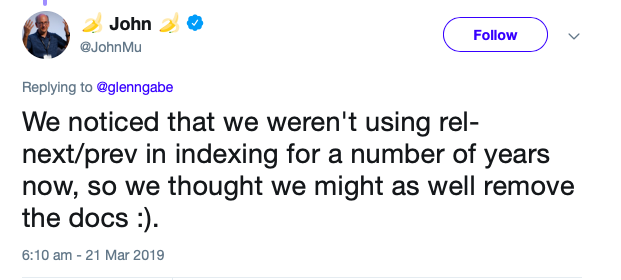In 2011 Google had launched a feature to support paginated content. What this meant that if you had content that was spread over multiple pages, then you could cluster them together into one series for Google to use in its search results. To do this, you could the markup rel = next and rel = prev. This could have been used to pagination so that a series of pages related to one topic or article or product could be grouped together and identified as a series by Google. Using this markup would have helped Google to consider all the related pages as a part of one series.
But now the news from Google is that this feature is no longer supported. This means Google would no longer consider an article split into many pages as one series. In fact, John Mueller, Webmaster Trends Analyst at Google has confirmed on Twitter that they had stopped supporting this feature for a few years.

Why this feature is not supported?
As Google has confirmed, support for the feature had not been supported for some years now. They have only confirmed it officially now. So, this means if an article is split into multiple pages, then Google will no longer view them as one. Each page would be considered as a separate one. So, the question is why did Google stop supporting this interesting feature?
The answer is simple. Things are much different today than it was 8 years back when the feature was introduced. Today’s trends are different. Almost 55% of internet users browse websites on their smartphones. With the advent of mobiles, most websites now make sure their content is on one page. Internet users will not prefer clicking on next again to view content. They prefer everything on one page.
In fact, a single page content for the entire website is popular. In such a time, splitting an article into multiple pages does not serve any purpose. In reality, websites were no longer using this feature as it was simply not needed. Content needs to be crisp and presented in a compact way to interest users. Internet users would love websites that present their content on one page. Splitting content and then trying to link them is old fashioned. It is no longer in vogue and that is the reason support for this feature has been stopped.
So, what should websites do now?
It is simple, if you want your website to get more traffic, it should be compact with clear and crisp content. You as a website owner can create pages that present all information in just one page. This is very convenient for more than half the internet users who browse websites on their mobile. So, in case you have articles or information split across pages, it’s time now to change them.
You can put all your content on one page so that it is convenient for users and for Google to search it.




